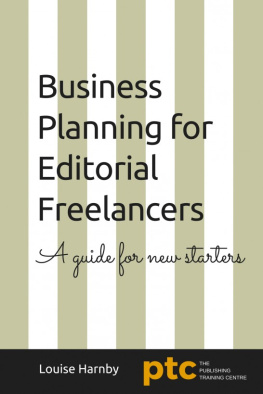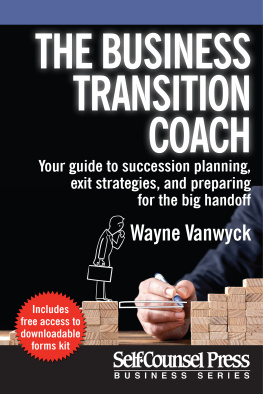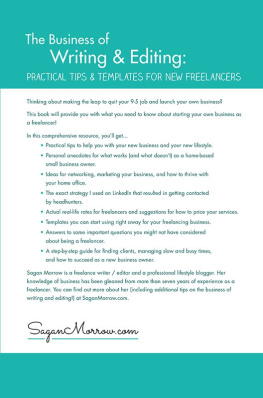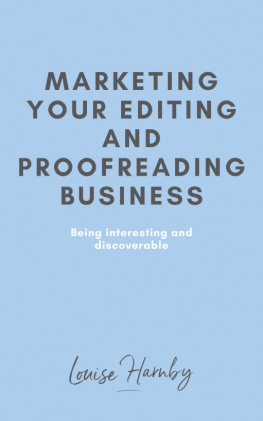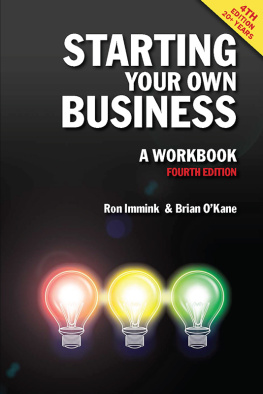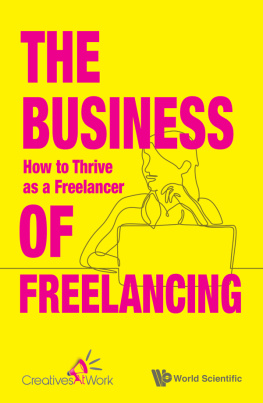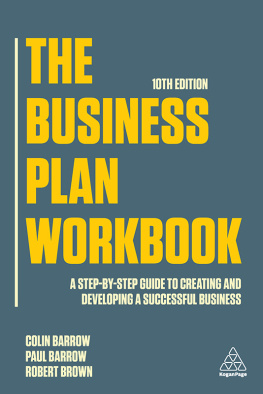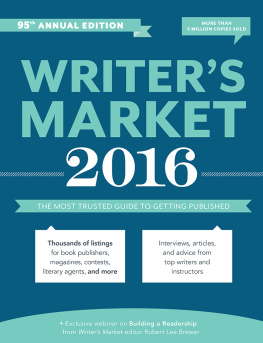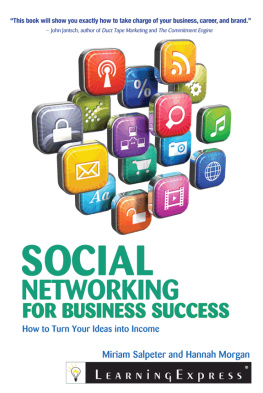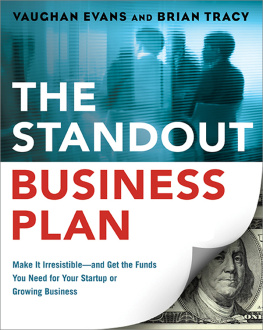Business Planning forEditorial Freelancers:
A Guide for NewStarters
Louise Harnby
in association with ThePublishing Training Centre
Copyright 2013 byLouise Harnby
Smashwords edition
Licence Statement
This ebook is licensedfor your personal enjoyment only. This ebook may not be re-sold orgiven away to other people. If you would like to share this bookwith another person, please purchase an additional copy for eachreader. If youre reading this book and did not purchase it, or itwas not purchased for your use only, then please return toSmashwords.com and purchase your own copy. Thank you for respectingthe work of this author.
CONTENTS
RECENT REVIEWS
This is exactly the book thatwould-be editorial freelancers need to read before setting up theirbusinesses. Author Louise Harnby gives practical, straightforwardbusiness advice and backs it up with portraits of successfuleditorial professionals. The case studies are quite instructive andinspiring. I will highly recommendBusiness Planning for Editorial Freelancersto all of the editors Imentor.
(Katharine O'Moore-Klopf, ELS,KOKEdit)
Louise Harnbys BusinessPlanning for EditorialFreelancers is a savvy and realistic guide to what, for newentrants, can be a difficult field to enter. Louise combines abusiness-first approach with a richly informative overview of theprofession that will be invaluable to newbies. In addition, thepractitioner focus sections are an outstanding feature and enablethe reader to learn from several other highly respected figures inthe industry. If youre thinking of setting out on the journey tobecoming a freelance editorial professional, make sure this is thefirst book you read. (Hazel Harris, Wordstitch)
This guide is essential reading for anyone thinking ofsetting themselves up as a freelance editor or, as Louise Harnbyemphasizes throughout, an editorial business owner. With Top Tipsand Learning Goals, every area of how to plan your new business iscovered in practical terms, backed up by case studies of some ofthe industrys most successful freelance editors. For those new topublishing, as well as those moving into self-employment with apublishing background, this guide offers everything you need toknow to get your business off the ground and moving in the rightdirection. (Jen Hamilton-Emery, Salt Publishing)
With this e-book, Louise Harnby has created a resource bothinteresting and useful for editorial freelancers embarking on theirbusinesses. Helpful, hopeful, yet realistic about the challengesahead, this book will leave its readers better informed, andtherefore better prepared, for their entry into this highlycompetitive field.
I feel sure that I canspeak for production editors in other publishing houses too when Isay that despite a well-populated database to choose from, aqualified, trusted freelance colleague is always sure to findthemselves inundated with offers of work. Louise has, so far,declined to look into the possibility of cloning her professionalself; this book is a valuable enough resource that I take theliberty of predicting that newer colleagues using it to chart theirown trajectories will ensure that she does not need to.(Madhubanti Bhattacharyya, Edward Elgar Publishing)
ABOUTTHE AUTHOR
Louise Harnby owns aneditorial business specializing in proofreading for academic andtrade publishers. She has worked in the publishing industry forover twenty years, initially with Williams & Wilkins and thenfor SAGE Publications. The birth of her child and the resultingdesire for more flexible working arrangements led her to set up herown company in 2005.
Louise completed ThePublishing Training Centres Basic Proofreading by DistanceLearning course with distinction in 2006 and is now an advancedmember of the Society for Editors and Proofreaders. As of April2013, she has over 300 proofreading projects under her belt.
She is the owner andcurator of the Proofreaders Parlour, a blog for editors andproofreaders, dedicated to providing information, advice, opinion,comment, resources, and knowledge-sharing related to the businessof editorial freelancing.
She lives in the heartof the Norfolk Broads.
Louise Harnby |Proofreader
louiseharnbyproofreader.com
ABOUT THE PUBLISHING TRAINING CENTRE
The Publishing Training Centre isan educational charity dedicated to the pursuit of excellence inpublishing. It grew from a small department at the PublishersAssociation more than thirty years ago and remains at the heart ofthe industry.
The PTCs courses arefocused on providing specific learning outcomes that are designedto thoroughly prepare freelancers for the work they will be askedto do. All the tutors are practitioners first and foremost, whichmeans that they bring their real-world experience with them to thecourses they teach, enriching the experience for students andmaking the training more practical.
In addition to itsdistance learning programmes, The Publishing Training Centre alsooffers a full range of classroom-based courses covering all aspectsof publishing.
Visit its website atwww.train4publishing.co.uk for full details.
ACKNOWLEDGEMENTS
My thanks to my colleagues and friendsat SAGE Publications, from whom I learned the language of socialscience publishing; to the many freelance editors and proofreadersfrom all over the world who continue to provide me withprofessional support, friendship and unending wisdom; to the folkat The Publishing Training Centre for their enthusiastic backing ofthis project; to Kate Haigh, Liz Jones, Nick Jones, JanetMacMillan, Anna Sharman and Marcus Trower for their invaluablecontributions; and to Mary McCauley, Johanna Robinson and GraceWilson, the case-study contributors who shared their recentstart-up stories with such honesty and clarity.
INTRODUCTION
If you are considering setting upyour own editorial freelance business, this guide is for you. Ithas been written for those with no publishing background or prioreditorial experience the completely new entrant to thefield.
While there are manydistinct functions to editorial freelancing project management,indexing, rewriting, fact checking, language localization,translation, copywriting, editing and proofreading forsimplicity, this guide refers primarily to editing andproofreading, since they are two of the most common points ofentry.
Creating a businessplan before you do anything else will help you to make the rightdecisions. Too often I receive cries for help from people sayingtheyve gone freelance but desperately need to work out how toacquire clients, or theyre wondering about what training isnecessary to get them started. I firmly believe that these issues(and others) need to be addressed before you embark on yourbusiness, not after. If youre not convinced, let me share thewords of one of the case study freelancers featured in Chapter 10:If I did it all over again, Id do all the business planning andcourses before I was doing my editorial training, not after. Ithink this would have given me more confidence in the beginning andprepared me for the reality.
This guide offers oneway of thinking about the steps you need to take to build youreditorial freelance business. Your business plan may look verydifferent and thats absolutely fine; after all, people order theirthoughts and ideas in different ways. The point, though, is to askthe necessary questions at the beginning, to focus your thoughtsstrategically, and to think about substantive ways in which youwill get your business off the ground. There is too muchcompetition out there to risk not doing so.
Business owner first, freelancer second
Its difficult toimagine a bank, venture capitalist or other financier agreeing tosupport a business start-up if theres no business plan. Theinformation in the plan demonstrates that the business owner hasresearched their market, is qualified to offer the service(s)theyre selling, has developed a set of realistic financialprojections, and understands what tools and skills will berequired. This information gives the financier confidence that thebusiness owner knows what they are doing before any capital isinvested. It helps them assess risk.
Next page
